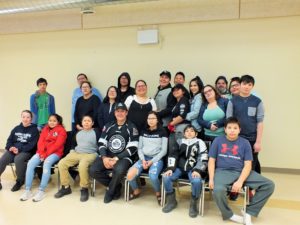Youth Wellness Group hosts inspirational conference for youth and parents

By Leslie Knibbs
SAGAMOK ANISHNAWBEK—On March 16, the Youth Wellness Group in Sagamok Anishnawbek First Nation hosted the H.E.A.R.T. (Holistic Emotional Awareness Response Training) Conference for youth and parents.
Jenna Guignard, youth Wellness Worker, invited special guest speaker retired professional hockey player Jason Simon from Aamjiwnaang First Nation to speak to youth and parents on finishing their education and to avoid alcohol and drug abuse.
Jason Simon spent 18 years playing professional hockey on 33 different teams in 12 different leagues—he was never out of work. Following his exit from pro hockey, he became depressed; he missed the game, the crowds and all the trappings a professional athlete enjoys. Without a diploma, a trade or anything in his background other than hockey, he began to abuse alcohol and drugs.
“I was physically, emotionally and spiritually dead,” he said.
A fortuitous meeting with Dianne Longboat from Six Nations on the Grand River turned his life around. A few days after meeting with Jason, Longboat came back to him and told him his spirit name was “Soaring Golden Eagle,” and that he “should go out there and help others.”
Simon took Longboat’s sage advice to heart. This was the beginning of what has become a mission in Simon’s life after hockey. He began working out again and got back into shape, his spirits soared and he was emotionally stable.
These positive feelings led Simon to completing his college diploma as a Medical Exercise Specialist. Now, only a few years later, he operates the Aamjiwnaang Athletic Club in Sarnia and goes out on the road to speak to youth and caregivers with his story of recovery, redemption and reclamation in hopes to inspire.
He still manages to keep his hockey skills tweaked by playing with the NHL Native Alumni joining Reggie Leach and others in hockey games across the land on many First Nations.
Simon’s desire to become a professional hockey player came early.
“When I was four-years-old, I went to my first hockey game and watched Bobby Orr score, I said, ‘Grandma, I’m going to be an NHL hockey player one day’,” recalled Simon.
Simon said he “lived and breathed hockey” from that day on wearing number four like his hero Bobby Orr for the next five years. Working his way up through the ranks, always playing with heart, Simon became known as an enforcer in the leagues he played in.
Recognizing his ability as an ‘enforcer,’ pro teams were not hesitant in putting him on the payroll. Simon recalled an incident when he was playing in the New Jersey Devils camp, he was a distant 11th-round draft pick that year. He told those at the conference, following an incident where he was being bullied on the ice “I beat the crap out of a guy.”
According to Simon, another player told him, “you’ve beat the toughest guy in the camp of the New Jersey Devils. Do you know what respect you have now?”
Shortly after the camp tryout, Simon got a call from management telling him to call his Dad right away. After calling his father, he learned his sister Jodi had been involved in a fatal car accident. He returned home immediately, but was assured by New Jersey management that there would be a place for him in the Devils’ organization when he returned. Simon spent three years playing for a New Jersey Devils’ farm club. Eventually, he got a call up from the New York Islanders and played five games in the NHL with the Islanders. The many injuries he sustained over the years put him out for the season that year.
Simon acknowledged an early mistake he made, telling parents and youth at the conference, “I put all my eggs in one basket [with my hockey career].”
Like other professional athletes, Simon has had more than his share of injuries resulting in lifelong health issues. He estimates he’s had between 50 and 60 concussions causing permanent brain injury from head trauma. Dealing with Chronic Traumatic Encephalopathy is difficult. Simon suffers from memory loss at times, confusion and on occasion, depression. According to Simon, his working out and staying in shape is a great help when dealing with these health problems.
Simon encouraged those at the conference to stick with their goals and finish their schooling first before making a decision on what they want to do with their lives, and if possible, go through the scholarship route if involved in a sport to develop not only as a player, but as a person.
Prior to his appearance in Sagamok, he was in the Yukon playing on the NHL Native Alumni team with Reggie Leach and others. Following his visit to Sagamok, Simon will go to Huntsville, Alabama to play in an exhibition game fundraiser. Later next month he will travel to Wemindji Cree Nation in northern Quebec for another Alumni series.
For more information on Jason Simon’s presentations, please contact him at 519-402-7183 or jasonsimon38@hotmail.com or jasonsimonhockey.com. He is the owner operator of the Aamjiwnaang Athletic Club at 1000 DeGurse Dr. Suite 1, Sarnia, Ontario N7T 7H5.

